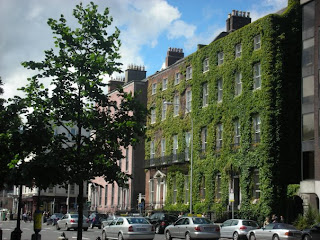No, it
was most definitely not just the ones in the books, on the stage or in the
exhibitions. For the most part, it was the turns of phrase I heard from new
friends (which had the warmth of old ones), taxi drivers and the occasional
random on the street that really endeared me to this town.
Not that
they didn’t cause me some confusion at times.
Your man
‘I saw your man Andrew on the weekend’
Lorna innocently
dropped this into the conversation one Monday morning in the staffroom, not
long after I arrived in Dublin. Lorna and I had recently become friends one
night after work over a bottle of Merlot. After the shop talk and the obligatory
questions about the number of siblings we both had, we discussed men. (In my
experience, swapping stories about men is how women galvanise new friendships.
I am not alone in thinking this. After my friend G confided in me who she had a
crush on for the very first time, she commented - ‘I just told you who I have a
crush on. We are proper friends now’). It turned out that Lorna and I both had an
‘Andrew’ in our lives, but I was fairly
sure mine was deeply ensconced in academic pursuits in a country far far away.
So the
above comment came as quite a surprise to me.
‘What?’ I
inquired eloquently.
‘Your man
Andrew, I saw him on the weekend’ she repeated.
WHAT, I raged to myself, had he been in town and
not seen me? Geeze,I knew things weren't great between us but seriously. How
did Lorna know it was him? Did she randomly meet him? How on earth had she
figured out it was my Andrew? What are the odds? What on earth was he doing
here? What is she not telling me? What is HE not telling me?
It is
amazing how many thoughts can actually fit into 0.00045 of a second.
This fleet
of successive thoughts were interrupted as Lorna continued with her story, and
as I soon gathered that we were not talking about my Andrew, but hers.
I had
forgotten about it until a few days later when a similar thing occurred.
‘Your man
in the café does a good coffee’ my boss commented.
‘Oh no, he’s
not mine. I barely even know him’ I
explained.
Blank
look from my boss.
It was at
about that time that I realised that ‘Your one over there…’,or ‘Your man in the café…’ was the same as saying
‘That person over there..., ‘That man in the café…’ and when Lorna had said ‘I saw your man Andrew
last weekend’ she had just meant that she had seen the Andrew she had been
talking over the third glass of Merlot .
No
possession, ownership or previous attachment to me required.
Your one
over here finally got it.
Grand
‘How are you?’
‘Grand
thanks’.
Grand is an obvious charmer.
It is my
humble opinion that if the rest of the English speaking world adopted ‘Grand’
as their response to ‘How are you?’ instead of ‘Fine’ or ‘Not bad thanks’, the
general state of world wide happiness would increase by at least 7 per cent.
Despite
my instant admiration for ‘Grand’, I didn’t use it when I first arrived. It
annoys me when visitors to a new country pick up the jargon (or in some cases,
the accent) within a few days. It jars my sensibilities and sets off my
bullshit radar. Over an extended period of time, you can’t help but pick up the
phrases you hear around you and acquire a bit of lilt in your intonation but it
certainly does not happen over a weekend.
So, it
was quite a nice surprise, one afternoon (after I had been in Dublin for a few
months) when, after G had offered to do
my photocopying for my next class, a little’ That would be grand’ popped out of my mouth in
response.
My first
authentic little grand. Grand.
Knackers
Knackers was
another phrase that I liked (although their matching grey tracksuits I was not
so fond of).
Knackers
are bogans or trailer trash (as in "The music festival was great, even
though they it was full of knackers').
Rob
Of course, the verb ‘rob’ is not particular to
the Irish but their use of it is. They use ‘rob’ in they same way I use ‘steal’
and most people use ‘borrow’, for example ‘Can I rob your pen for a minute? Tanks’. (NB, ‘tanks’ is not
a spelling mistake. Just my attempt at phonetic realism as the whole ‘th’ sound
is not so popular in Dublin).
Crack
'Good
crack’ was another phrase I liked, though I could never make it my own. I did
resist the urge to comment that while good crack means a good time in Dublin,
where I come from it means good heroin.
Langers
My all time
favourite. Langers means drunk. As in ‘I was absolutely langers on Friday night’.
As in ‘I
do miss getting a little bit langers with my ones in Dublin’. And I do.
How is it
possible to get a pang, no an ache, in my heart of homesickness for a place that
was only home for six months?



















